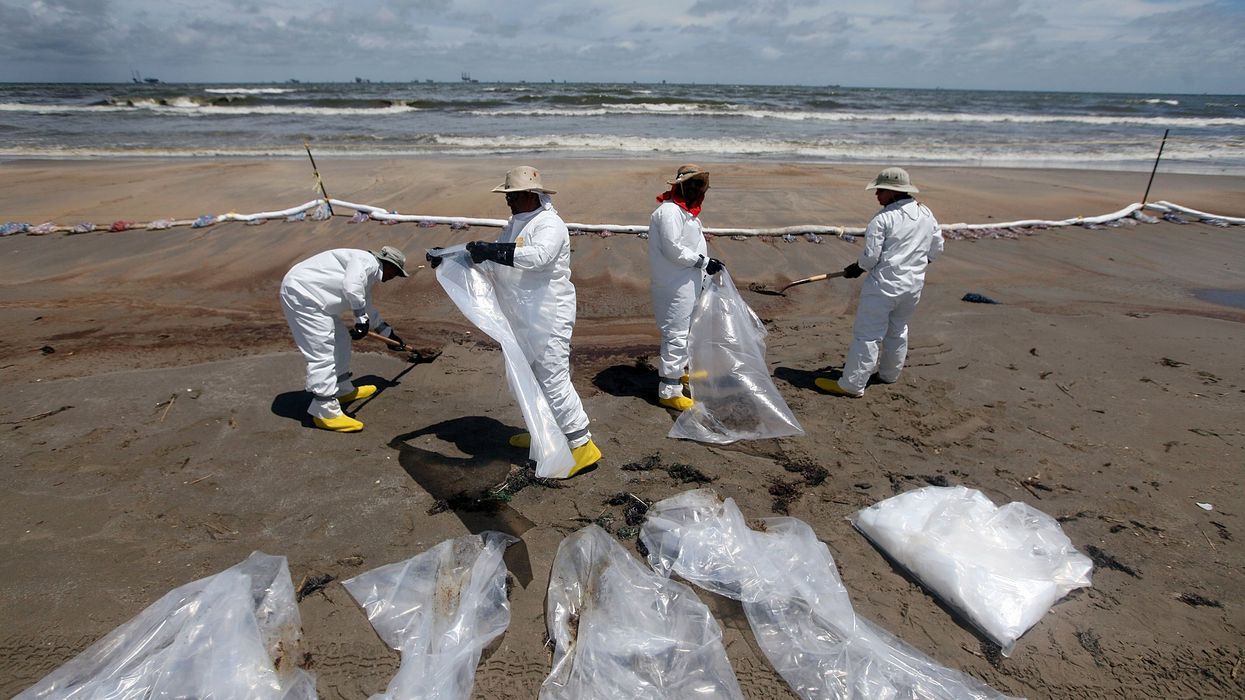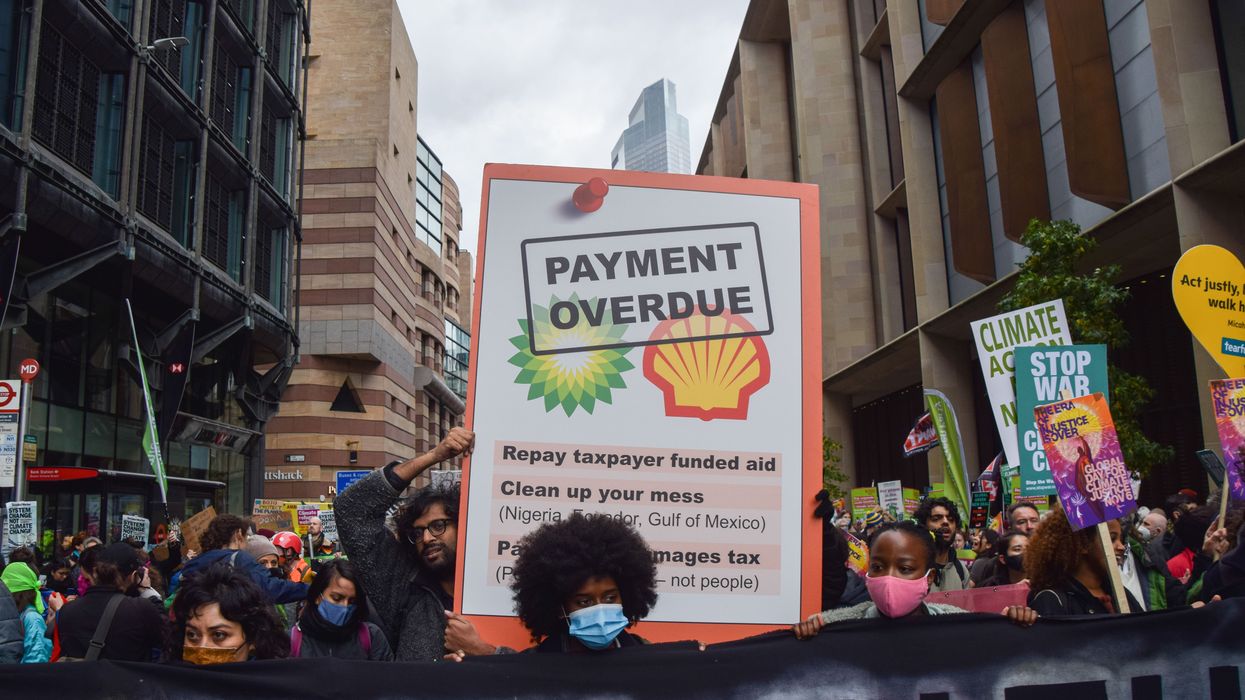BP worked from the same playbook as the Ad Council. After acknowledging that climate change exists, the company makes you feel responsible for it. And then they give you something to do that helps you feel like you're part of the solution. Meanwhile, BP continues pumping away, enjoying massive federal subsidies and outlandish profits while avoiding any new, restrictive regulations.
The strategy was popular. One analysis of decades of ExxonMobil’s public communications found that the corporation framed climate change in terms of consumer energy demand when speaking publicly. But in internal company documents, ExxonMobil recognized that it could not continue to supply fossil fuels without disastrous consequences to the environment. They knew they were causing the problem (supply) but put the blame on us (consumer demand).
The general template should sound familiar. What causes climate change? We do. How? Driving gas guzzlers, leaving on the lights, and buying unrecyclable plastic. What’s the solution? Stop doing these things. Consume better.
ExxonMobil even conducted its own secret research on climate change in the 1970s. The results were consistent with scientific predictions. The corporation's in-house models predicted that global temperatures would rise to within 0.2°C of what they have in fact risen to since. While it publicly claimed in 1997 that “some of today’s prophets of doom from global warming were predicting the coming of a new ice age,” in the 1970s, Exxon’s own scientists had privately been in agreement all along with the overwhelming majority of published science on climate forecasting.
Once you know what to look for, you start to see the message of personal responsibility everywhere. Worried about retirement? Start saving more. Have a gambling problem? Exercise some willpower and stay away from the casino. Worried about obesity? Fix your lifestyle. From 2008 to 2010, 87 percent of all alcohol ads in magazines told consumers to “drink responsibly.”
While it was becoming clearer that Americans consume too much sugar, Coca-Cola fought back by subsidizing research arguing that the problem was not calories in but calories out: “Americans are overly fixated on how much they eat and drink while not paying enough attention to exercise.” The central plank of the food industry’s lobbying has been to frame discussions about eating habits in terms of personal responsibility (e.g., “portion control”).
What these messages minimize are all the social, structural, and systemic drivers of health problems like diabetes. In one New York Times article, Dr.Dean Schillinger explained how “our entire society is perfectly designed to create Type 2 diabetes.” There is no amount of scolding about sugary foods and exercise, he explains, and “no device, no drug powerful enough to counter the effects of poverty, pollution, stress, a broken food system, cities that are hard to navigate on foot, and inequitable access to healthcare, particularly in minority communities.”
Yet these companies have devoted enormous amounts of money to teaching the public to focus on the symptoms rather than the underlying system. They have taught us to track what we buy, and take responsibility for what we do with the stuff we buy, so that they won’t have to stop making and selling the stuff we buy from them or deal with laws regulating how they do it.
A Too-Convenient Model for Facing Inconvenient Truths
Whole social movements have been built around this individualist, little-things-add-up ethos. An iconic poster from the early days of the modern environmental movement mirrors the Ad Council’s claim that personal choices are both the cause of and the solution to pollution. This individualist thinking prevailed all the way from the 1970s environmental movement to May 2006, which marks one of the biggest box office events in documentary history: the release of Al Gore’s An Inconvenient Truth. The documentary reached millions of people around the world. Its vivid depictions of solar rays pelting the atmosphere and glaciers melting raised public awareness of climate change to new heights and ignited collective fervor about the environment like never before. It demanded action.
Widely and deservedly lauded, An Inconvenient Truth presented the facts in a way that was hard to argue with. It also presented solutions:
Each one of us is a cause of global warming, but each one of us can make choices to change that with the things we buy, the electricity we use, the cars we drive; we can make choices to bring our individual carbon emissions to zero. The solutions are in our hands, we just have to have the determination to make it happen. We have everything that we need to reduce carbon emissions, everything but political will. But in America, the will to act is a renewable resource.
The general template should sound familiar. What causes climate change? We do. How? Driving gas guzzlers, leaving on the lights, and buying unrecyclable plastic. What’s the solution? Stop doing these things. Consume better. This is another effect of the long history of corporate-funded individualist messaging: the first thing that comes to mind for many of us when we ask “what can I do?” is a series of thoughts about stuff. What should I buy? Where should I buy it from? What should I do with it? Even leaders in the fight against climate change have perpetuated our preoccupation with consumption.
As the credits of An Inconvenient Truth roll, the film offers concrete suggestions for how to make a difference, stating, “The climate crisis can be solved. Here’s how to start.” Here are the first five items in the list:
- Buy energy-efficient appliances + lightbulbs.
- Change your thermostat . . . to reduce energy for heating + cooling.
- Weatherize your house, increase insulation, get an energy audit.
- Recycle.
- If you can, buy a hybrid car.
These are good things to do, though energy-inefficient incandescent bulbs are basically illegal now and hybrid cars may be on their way to being old news. But An Inconvenient Truth exemplifies a whole world of books, TV, and academic research that looks at climate change through the lens of our personal consumer choices. Even academics have gotten in on the act. One widely cited study examined and ranked nearly 150 personal lifestyle choices by their effectiveness in reducing personal carbon footprints. The four most impactful options, it found, are having one child, living car-free, flying less, and eating a plant-based diet. Eventually, further down the list of action items, An Inconvenient Truth also tells viewers to do the following:
- Vote for leaders who pledge to solve this crisis.
- Write to congress.
- If they don’t listen, run for congress
- Speak up in your community.
- Insist that America freeze CO2 emissions + join international efforts to stop global warming.
These suggestions head in a different direction, away from what we buy. They gesture toward our political choices and our communities’ values. This is promising, and we’ll talk a lot more about why in the coming chapters. For now, notice how vague they are. “Speak up in your community” sounds empowering, but what does it really mean? Speak up to whom? Say what? “Join international efforts” sounds good too. But your average moviegoer may be forgiven for thinking, “Yeah, I’ll get right on that.” Most viewers likely walked out feeling alarmed, maybe intending to buy better lightbulbs. After all, lightbulbs were first on the list!
It turns out audiences did become both more knowledgeable and more concerned about the climate crisis. But this new found knowledge and concern doesn’t appear to have amounted to much, at least in the short term. One study found that a month after seeing the film, viewers had done next to nothing to put their newfound climate knowledge into action. Not one of them had examined their carbon footprint or written a letter to their senator.
Another study found that framing solutions in terms of individual consumer choices decreases people's willingness to take other forms of action to fight climate change. Maybe people feel like they’re being blamed for a global crisis beyond their control. Maybe they resent being asked to respond with what to them looks like merely symbolic, even futile, changes to their personal behavior. The danger, then, is not just that such messages don’t help. It’s that they might be making things worse.
System Change, Not Climate Change
Some people have started to get wise to this long history of corporations laying problems at the feet of individuals. The backlash it’s helped create has produced slogans now found on fridge magnets, protest posters, and newspaper headlines. The most common ones suggest a different kind of thing to do: stop worrying about personal choices, and start focusing on changing the system. The news site Vox published an article in 2019 whose headline perfectly expresses this idea: “I Work in the Environmental Movement. I Don’t Care If You Recycle.”
The Sunrise Movement, a decentralized, youth-led group at the forefront of progressive climate politics, advocates system change: “to abolish or reimagine institutions that degrade our communities and our climate.” This marks a generational sea change in climate activism. Abolishing or reimagining institutions was most certainly not on An Inconvenient Truth’s list. Writing for the New Yorker, Andrew Marantz recounts a telling experience with a Sunrise group in Philadelphia:
The organizers were scanning the menu of a Middle Eastern restaurant on Uber Eats. Aru Shiney-Ajay, Sunrise’s training director, sat at a laptop, taking orders. “Can you get me a beef kebab?” Dejah Powell, an organizer from Chicago, said. “Or, no. Beef is the worst, right? Maybe chicken. Or falafel?”
“Dejah,” an activist named John Paul Mejia said, in a mock-scolding tone. He started reciting a movement adage, using the singsong rhythm of a call-and-response: “The biggest driver of emissions is . . .” The others joined him, in unison: “. . . the political power of the fossil-fuel industry, not individual behavior.” In other words, if you want the beef, get the beef.
One way to think about Sunrise’s system-over-individual logic is to recall Iron Eyes Cody. We called him a fraud, but looked at another way, his personal deception obscures the bigger story. A first-generation Sicilian American was able to play some of the most iconic Native American roles in Hollywood because the movie industry excluded actual Native Americans from taking those roles. The biases woven into cultural norms and movie business practices allowed, and incentivized, Cody’s personal fraud. Too much focus on what he should or shouldn’t have done, as a single person, makes it easy to overlook the system that structured his options and made his personal choices possible in the first place. Coming to appreciate the significance of systems can be disorienting, but keeping that significance firmly in view is crucial to understanding the bigger picture. The little-things-add-up take on individual responsibility is too easily weaponized by corporations advancing their own interests. When it comes to climate change, they have long pushed a picture where “taking action” means tweaking our shopping choices. It’s this history that Sunrise and other progressive climate activists are rightly standing at war, yelling stop.
But even if we accept this change in perspective, it’s not at all obvious what we should do next. To take that step, we’ll look at another area of life where a loud chorus is rightly demanding structural change.




